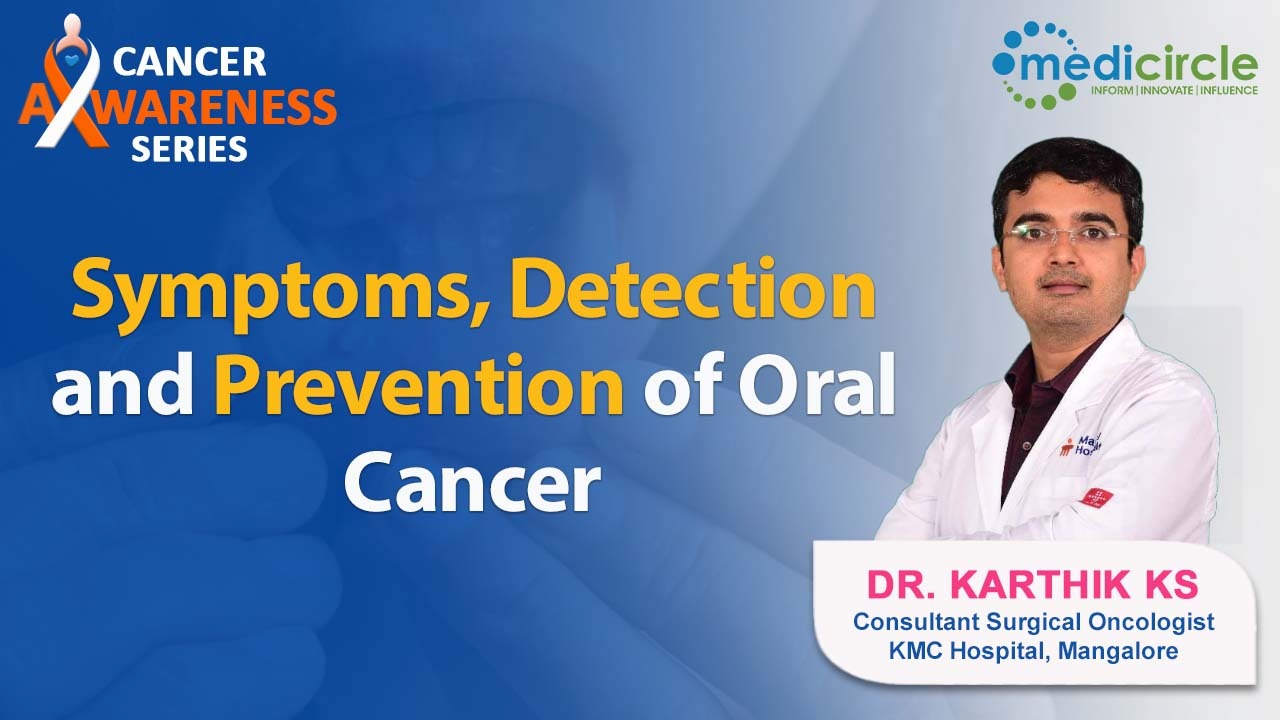Oral cancer is the most common cancer in India amongst men (11.28% of all cancers), the fifth most frequently occurring cancer amongst women (4.3% of all cancers).
Dr Karthik KS a Consultant Surgical Oncologist, at KMC Hospital Mangalore. For The past 9 yrs, he has been working in this field.
All you need to know about oral cancer
Dr Karthik KS informs, “Oral cancer is cancer of the oral cavity which starts from the lips or the outer part of the lips and extends to the oral cavity. These patients present with ulcers or proliferative disease in the mouth. These cancers have 90% correlation with tobacco consumption which may be in chewable or smoking form. Oral malignancy is highest among people who consume tobacco in any form.”
Signs and symptoms of oral cancer
Dr Karthik KS states, “We should focus on high-risk individuals who are using tobacco in any form. The signs and symptoms of oral cancer are as follows-
- Any form of ulceration in the mouth
- Non-healing ulcer since more than 1 week or 15 days
- Human Papillomavirus
- Sharp tooth unground or untreated for few years
- Non-healing of oral lesions.”
Preventive measures to treat oral cancer
Dr Karthik KS says, “When we are aware of the cause of oral cancer, this is the root we have to treat.
- Oral cancer prevention is best done by avoiding use of tobacco
- Any form of tobacco consumed and then stopped, that person can never come back to normalcy but reach near normal which takes 15-20 years.
- Prevention is the best strategy
- Guide, train and educate people in all forms to prevent cancer
- People who are smoking or under high-risk groups are informed to visit the doctor whenever they have ulceration in the mouth.”
Detection and diagnosis of oral cancer
Dr Karthik KS says, “We usually get these patient with following presentation like-
- Oral Maxillary surgeon or dentists to get loose tooth extracted
- Index of suspicion increases when patient is using tobacco
- Non-healing ulcers for more than 2 weeks need further evaluation with biopsy and treatment according to biopsy results.
Severity of oral cancer
Dr Karthik KS informs, “The problem with oral cancer is- it decreases efficiency such as -
- Patient is unable to eat
- Painful tumor
- Locally aggressive tumor
- Increased morbidity by infiltrating the surrounding tissues
Government has increased its strategy against tobacco. There are famous anti-smoking ads where they show a part of the tumor being removed and how the morphology changes. At an individual level, it is associated with a lot of morbidity at late stage or oral cancer. However, when a patient presents to us at an early stage, we can help with a good treatment outcome with minimal morbidity. As a society, In India, a huge chunk of the population is affected by oral malignancy. The best way is for the government to advocate a strategy towards anti-tobacco.”
Rapid Fire
1. Can cancer patients live a normal life after treatment?
Dr Karthik KS states, “Yes, very much. It's a myth that cancer is not curable. If a patient gets treated at an early stage, the morbidity of the disease will be minimal and the patient's survival will be long. It is wrong to think that cancer is not curable. In India, we are getting the patients detected with cancer in stage 3 or 4. When patients get detected in stage 3 or 4, the morbidity is higher and survival reduces. So, please get presented to get treated and evaluated at an early stage with the doctors.
2. Does oral cancer spread quickly?
Dr Karthik KS states, “Regarding spread of any tumor, there are two things taken into account-
- Tumor biology which tells about aggressiveness of the disease
- Host immunity and body’s tolerable well and defensive mechanism of the body
Spread of the tumor depends on the tumor biology and host immunity. It is very difficult to say which tumor behaves in which type of the body. The best thing is to present to the doctor as early as possible.
3. What is the average age of getting oral cancer?
Dr Karthik KS states, “The oral cancers are more common in the age group of 40s- 50s. But, we get patients from all age groups as young as 25 because they might have started with tobacco associated habits. There are patients from 80-90 years as well.
Edited By: Dr.Rati Parwani
Contributed By: Dr Karthik KS, Consultant Surgical Oncologist, KMC Hospital Mangalore

 Tobacco is the main reason for oral malignancy. Dr Karthik KS provides valuable insights with his expertise on causes, symptoms and solutions to oral cancer. He also emphasizes on the importance of early detection of cancer for better treatment and good survival rate.
Tobacco is the main reason for oral malignancy. Dr Karthik KS provides valuable insights with his expertise on causes, symptoms and solutions to oral cancer. He also emphasizes on the importance of early detection of cancer for better treatment and good survival rate. 









.jpeg)

.jpg)


















.jpg)